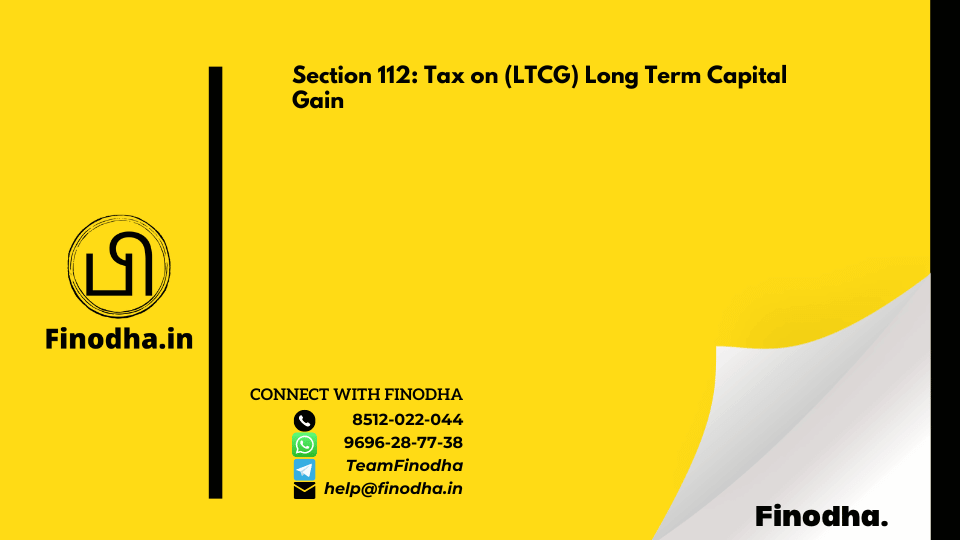Important Keyword: Capital Gains, LTCG, Section 112.
Table of Contents
Section 112: Tax on Long Term Capital Gain
Capital gains, the income or loss from selling a capital asset, are subject to taxation. When this gain stems from the sale of a long-term capital asset, it’s termed Long-Term Capital Gain (LTCG). The Income Tax Act delineates provisions for LTCG taxation, primarily under Section 112 and Section 112A.
Section 112 of the Income Tax Act governs the taxation of LTCG on assets not covered by Section 112A. This section outlines the tax treatment for long-term capital gains from assets other than those specified under Section 112A.
What is Section 112 of the Income Tax Act?
Section 112 of the Income Tax Act is a key provision governing the taxation of long-term capital assets. It encompasses a wide range of taxpayers, including individuals, Hindu Undivided Families (HUFs), partnership firms, companies, residents, non-residents, and foreign companies. This section specifically addresses capital gains arising from the sale of various long-term capital assets.
Long-term capital assets covered under Section 112 include:
- Securities (other than units) listed on a recognized stock exchange in India
- Units of the Unit Trust of India
- Zero-coupon bonds
- Securities not listed on a recognized stock exchange in India
- Immovable property, such as land or buildings, or both
- Any other capital asset
However, Section 112 does not apply to capital gains on the sale of certain long-term capital assets covered under Section 112A, which include:
- Listed equity shares where Securities Transaction Tax (STT) is paid on acquisition or transfer
- Units of equity-oriented mutual funds where STT is paid on transfer
- Units of business trusts where STT is paid on transfer
Income tax on long-term capital gains under Section 112 is determined based on the nature of the asset and the holding period. The applicable tax rates for LTCG under Section 112 vary as follows:
| Asset Type | Holding | Tax Rate on LTCG |
| Listed Securities (other than unit) | 12 months | 10% without indexation |
| Zero-Coupon Bonds | 12 months | Lower of 10% without indexation or 20% with indexation |
| Unit of Unit Trust of India | 12 months | 20% with indexation |
| Unlisted Securities (Transfered by Non resident/ Foreign Company) | 12 months | 10% without indexation |
| Unlisted Securities | 24 months | 20% with indexation |
| Immovable Property | 24 months | 20% with indexation |
| Any other asset | 36 months | 20% with indexation |
Adjustment of LTCG u/s 112 against Basic Exemption Limit
Adjusting LTCG under Section 112 against the Basic Exemption Limit provides taxpayers with a strategic tax planning opportunity. Residents can utilize this provision to offset their special rate income, such as LTCG under Section 112, STCG under Section 111A, or LTCG under Section 112A, against the basic exemption limit. By doing so, taxpayers can effectively reduce their tax liability, paying tax only on the remaining income beyond the basic exemption limit.
LTCG u/s 112 – Reporting in Schedule CG of ITR
Reporting LTCG under Section 112 in the Income Tax Return (ITR) involves detailing various aspects in Schedule CG of ITR-2 or ITR-3. Taxpayers need to furnish information such as the full value of consideration (sales value), deductions under Section 48, indexed cost of acquisition and improvement, as well as expenditure related to the transfer.
Regarding the set-off and carry forward of Long-Term Capital Loss (LTCL) under Section 112, taxpayers can offset LTCL against LTCG from another capital asset in the same year. Any remaining loss can be carried forward for up to 8 years to set off against future LTCG.
Exemption from LTCG Tax under Section 112
Taxpayers may also qualify for exemptions from LTCG tax under Section 112 by investing in specified assets. These exemptions are available for various types of capital assets, such as listed securities without STT, zero-coupon bonds, immovable property, and unlisted securities. Sections 54EE and 54F provide exemptions for investment in specified funds or residential house property, respectively. Taxpayers must reinvest the proceeds from the sale into the specified asset and adhere to the specified holding period to claim these exemptions. Alternatively, they can utilize the Capital Gains Account Scheme to temporarily hold the sale proceeds until reinvestment.
Section 112, Section 112A, and Section 111A of the Income Tax Act delineate distinct tax provisions concerning capital gains, particularly long-term and short-term gains on specific assets.
Here’s a breakdown of each section:
- Section 112:
- Applicability: Applies to all long-term capital assets as defined under Section 2(29AA) of the Income Tax Act.
- Tax Rates: Prescribes different tax rates for long-term capital gains on various assets, excluding those covered under Section 112A.
- Section 112A:
- Applicability: Applies specifically to long-term capital gains arising from the sale of specified assets, including equity shares, equity mutual funds, and units of business trust, provided Securities Transaction Tax (STT) is paid on the transaction, and they are listed on a recognized stock exchange in India.
- Overrides Section 112: Section 112A supersedes Section 112 concerning long-term capital gains on specified assets. It provides a distinct tax treatment for such gains.
- Section 111A:
- Applicability: Applies to short-term capital gains resulting from the sale of equity shares, equity mutual funds, and units of business trust, subject to the condition that STT is paid on the transaction, and they are listed on a recognized stock exchange in India.
- Focus: Primarily addresses short-term capital gains tax implications for transactions involving specified securities.
In essence, while Section 112 encompasses long-term capital gains on all qualifying assets, Section 112A and Section 111A offer specific tax treatments for long-term and short-term gains, respectively, arising from the sale of specified securities listed on recognized stock exchanges. These sections play a crucial role in defining the taxation framework for capital gains in India, ensuring clarity and consistency in tax treatment across different asset classes and holding periods.
Read More: Cost Inflation Index: CII Income Tax
Web Stories: Cost Inflation Index: CII Income Tax
Official Income Tax Return filing website: https://incometaxindia.gov.in/





0 Comments